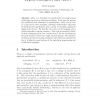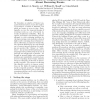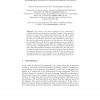FOCS
1989
IEEE
14 years 3 months ago
1989
IEEE
We introduce a temporal logic for the speci cation of real-time systems. Our logic, TPTL, employs a novel quanti er construct for referencing time: the freeze quanti er binds a var...
KGC
1993
Springer
14 years 3 months ago
1993
Springer
We provide a logical speci cation of set predicates ndall and bagof of Prolog. The speci cation is given in proof theoretic terms, and pertains to any SLD resolution based language...
HOA
1993
14 years 3 months ago
1993
Abstract. The Spectrum project concentrates on the process of developing well-structured, precise system speci cations. Spectrum is a speci cation language, with a deduction calcul...
COMPASS
1994
14 years 3 months ago
1994
ASL+ is a formalism for speci cation and programming in-the-large, based on an arbitrary institution. It has rules for proving the satisfaction and re nement of speci cations, whic...
VL
1994
IEEE
14 years 3 months ago
1994
IEEE
Employing diagrams in the UI causes problems that don't exist in so called Graphical User Interfaces. We are implementing a tool for generating editors for a certain class of...
TIME
1994
IEEE
14 years 3 months ago
1994
IEEE
We formulate an algebra of binary temporal relations between events the number of occurrences of which is unknown, but which are known to recur in time. Ontologically, we view the...
LICS
1994
IEEE
14 years 3 months ago
1994
IEEE
Relational languages such as Ruby are used to derive circuits from abstract speci cations of their behaviour. Much reasoning is done informally in Ruby using pictorial representat...
ICDE
1994
IEEE
14 years 3 months ago
1994
IEEE
In applications like
nancial trading, scheduling, manufacturing and process control, time based predicates in queries and rules are very important. There is also a need to de
ne ...
TAPSOFT
1997
Springer
14 years 3 months ago
1997
Springer
This paper presents an approach for specifying complex, structured systems with Evolving Algebras by means of aggregation and composition. Evolving algebras provide a formal method...
TACS
1997
Springer
14 years 3 months ago
1997
Springer
We present a type-based technique for the veri cation of deadlock-freedom in asynchronous concurrent systems. Our general approach is to start with a simple interaction category, i...



